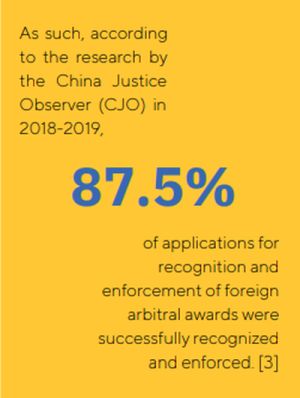China's large-scale infrastructure projects within the framework of the Belt and Road Initiative (known within China as the One Belt One Road), cooperation in key sectors, participation in the Shanghai Cooperation Organization, and other factors contribute to the further development of trade and economic relations between the countries of the Commonwealth of Independent States and China, making the issue of recognition and enforcement of foreign arbitral awards in China even more relevant.
THE LEGAL FRAMEWORK FOR THE RECOGNITION AND ENFORCEMENT OF FOREIGN ARBITRAL AWARDS
In 1987, China acceded to the Convention on the Recognition and Enforcement of Foreign Arbitral Awards 1958 (hereinafter – the New York Convention).
When acceding to the New York Convention, China made two reservations.
- One of them is that the New York Convention only applies to the recognition and enforcement of arbitral awards made in the territory of another contracting state. This is known as the "reciprocity reservation".
- Another so-called "commercial reservation" stipulates that the New York Convention should only apply to those legal relationships that are considered commercial under the national law of the PRC.
- In this article, we will not review the list of necessary documents for recognition and enforcement of foreign arbitral awards in the PRC, since the national legislation of the PRC, which regulates the recognition and enforcement of foreign arbitral awards, complies with the New York Convention subject to the above-indicated two reservations.
Article 290 of the Civil Procedure Code of the PRC provides that in cases where an arbitral award of a foreign arbitral institution needs to be recognized and enforced by Chinese courts, the parties concerned must directly apply to the People's Court at the place of residence of the defendant or the location of the defendant's property. The court will consider this issue in accordance with the international treaties, i.e., the New York Convention, bilateral international agreements, and the principle of reciprocity.
In order to implement the provisions of the New York Convention, the Supreme People's Court of the PRC issued the Notice of Enforcement of the Convention on the Recognition and Enforcement of Foreign Arbitral Awards in 1987, which clarifies the rules applicable to the New York Convention, including jurisdiction, terms for filing applications, standards of appeal for recognition and enforcement, etc.
TO FURTHER CLARIFY THE RULES ON THE RECOGNITION AND ENFORCEMENT OF FOREIGN ARBITRAL AWARDS, IN 1995, THE SUPREME PEOPLE'S COURT ISSUED THE NOTICE TO THE PEOPLE'S COURT DEALING WITH FOREIGN ARBITRATION, WHICH WAS FURTHER REVISED IN 2008 (THE NOTICE 2008).
The Notice 2008 clarifies the circumstances under which Chinese courts may refuse to recognize or enforce foreign arbitral awards. In addition, the Notice 2008 also strengthens the supervision of the People's Courts over the recognition and enforcement of foreign arbitral awards by establishing an internal reporting system.
Under this reporting system, when the People's Court is inclined to refuse recognition or enforcement of a foreign arbitral award, it must submit a report to the superior People's Court of appellate instance (People's High Court) for further consideration.
If the People's High Court is also of the opinion that the recognition should be refused, the case must be referred to the Supreme People's Court of the PRC for the final consideration and resolution before the application for recognition can be refused.
THUS, THE PEOPLE'S COURT HAS A RIGHT ONLY TO RECOGNIZE A FOREIGN ARBITRAL AWARD, WHILE THE REFUSAL TO RECOGNIZE A FOREIGN ARBITRAL AWARD CAN ONLY BE MADE BY THE SUPREME PEOPLE'S COURT OF THE PRC.
On December 31, 2021, the Supreme People's Court of the PRC has published a summary of the Supreme Court Symposium with clarifications on the implementation of the New York Convention. 1 The key clarifications in 2021 address the following issues:
- Failure to engage in "negotiations prior to arbitration" is not a procedural violation under Article V(1)(d) of the New York Convention.
- If a Chinese court has already ruled that the arbitration agreement between the parties is not concluded, void, invalid, or the statute of limitation has expired, and recognition and enforcement of the arbitral award would be contrary to the decision of the Chinese court that has entered into force, the Chinese court must refuse to recognize such an arbitral award as it violates a public order, as provided for in Article 5(2)(b) of the New York Convention.
It should be noted that the summary of the symposium only confirms the previous practice of the Chinese People's Courts.
In the 2018 case, the basis for the refusal of the Chinese court was that the court had upheld the invalidity of the arbitration clause.
Since China's accession to the New York Convention, Chinese courts have only twice (in 2008 and 2018) refused to recognize and enforce foreign arbitral awards on grounds that are contrary to the public order. 2
The opinions of the Chinese courts in the 2018 and the 2008 cases can be summarized as follows.
In the 2018 case, the concerned parties applied for arbitration in a foreign state, even when the Chinese court had already declared the invalidity of the arbitration agreement.
Accordingly, the Chinese court ruled that the arbitral award violated China's public order.
In the 2008 case, the Chinese court ruled that the arbitral award contained decisions on issues that were not submitted for consideration in arbitration and, thus, simultaneously violated China's public order.
THE PRACTICE OF RECOGNITION OF FOREIGN ARBITRAL AWARDS IN CHINA
Based on the research of the database of court decisions, from 2001 to 2022, there were 243 cases related to the recognition and enforcement of foreign arbitral awards, of which only 43 cases resulted in the refusal of recognition and enforcement.
The information on the percentage of successful recognition cases varies in different sources. This is due to the fact that in the relevant calculations, most often the subject of the analysis are the cases in which civil proceedings have been initiated, while some calculations also take into account the cases in which civil proceedings have not been initiated, and applications for recognition have been returned or withdrawn

In 2019, Chinese courts considered a total of 30 cases on the recognition and enforcement of foreign arbitral awards. Chinese courts recognized and enforced foreign arbitral awards in whole or in part in 21 cases; in three cases, the Chinese courts refused recognition, and in the remaining six cases, there was a dispute over jurisdiction, or the applications were withdrawn by the applicants
In other words, a total of 24 cases were considered on the merits, 21 of which concerned the recognition and enforcement of arbitral awards, which led CJO to conclude that the success rate of recognition of foreign arbitral awards is 87.5%
According to other sources, from 2005 to 2015, 68% of cases were recognized, while from 2015 to 2017, the average recognition rate was 75.3%, and from 2018 to 2022, 66.7% of cases were recognized. 4
These calculations took into account all cases, including those withdrawn or not accepted for consideration on the merits, in which the civil proceedings were not initiated.
THE STATE FEES
The state fee for the application for recognition of a foreign arbitral award is 500 Chinese yuan (approximately US$ 71).
The court fees for enforcement proceedings are calculated based on the amount subject to enforcement. In particular, the fee rates for each enforcement proceeding are as follows:
- from 50 yuan to 500 yuan for nonproperty disputes;
- 50 yuan if an enforcement includes the amount that does not exceed 10,000 yuan;
- 1.5% of the amount exceeding 10,000 yuan but less than 500,000 yuan;
- 1% of the amount exceeding 500,000 yuan but less than 5 million yuan;
- 0.5% of the amount exceeding 5 million yuan but less than 10 million yuan;
- 0.1% of any amount exceeding 10 million yuan.
Click here to continue reading . . .
Footnote
1. http://cicc.court.gov.cn/html/1/218/62/409/2172.html Supreme Court Symposium with clarifications on the implementation of the New York Convention
2. https://zh-tw.chinajusticeobserver.com/a/china-refuses-to-recognize-a-foreign-arbitral-award-onthe-grounds-of- public-policy-for-the-2nd-time
3. https://www.cjoglobal.com/index.php/2021/12/10/can-foreign-arbitral-awards-be-enforced-in-china/
4. 浅析外国仲裁裁决在中国的承认和执⾏, 张毅 朱安然, ⾦诚同达律师事务所 http://www.cqlsw.net/business/theory/2022111839919.html
The content of this article is intended to provide a general guide to the subject matter. Specialist advice should be sought about your specific circumstances.


